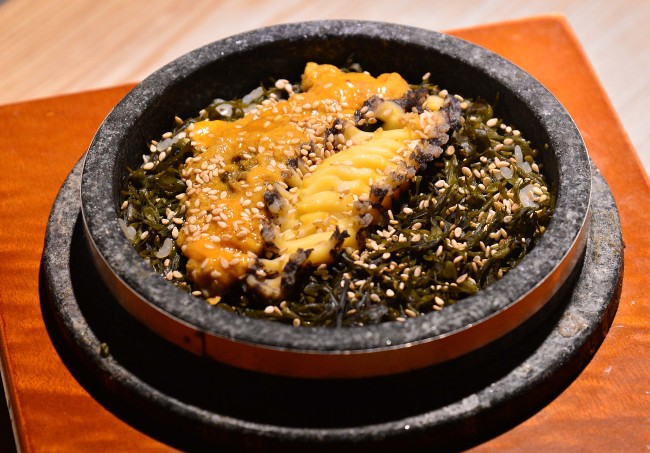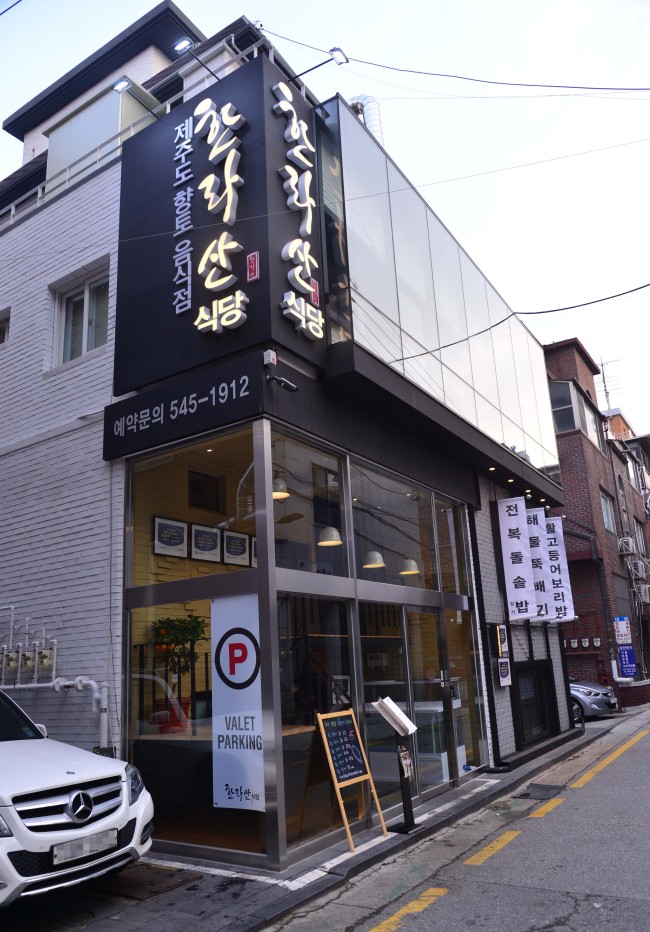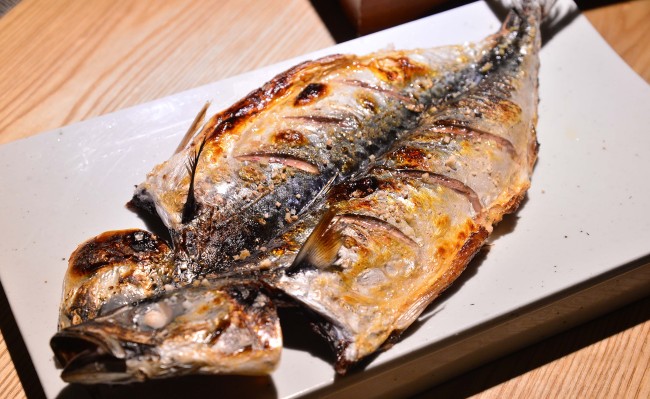Jeju Island cuisine at Hallasan
New eatery specializes in dombe pork and other regional delicacies
By Korea HeraldPublished : Dec. 9, 2016 - 13:47
In Korea, the diversity of seaweed can be dizzying, from silken thin maesaengi to strands of emerald green parae and wide ribbons of miyeok.
Among the staggering Korean lexicon of edible algae there is a delicacy traditionally enjoyed on Jeju Island called mojaban or mom.
Thicker than parae but thinner than miyeok, mom is customarily enjoyed in a pork-based soup called mom-guk on Jeju Island.
On the mainland, mom-guk can be had at Hallasan Korean Food Restaurant, which specializes in Jeju Island cuisine.
Among the staggering Korean lexicon of edible algae there is a delicacy traditionally enjoyed on Jeju Island called mojaban or mom.
Thicker than parae but thinner than miyeok, mom is customarily enjoyed in a pork-based soup called mom-guk on Jeju Island.
On the mainland, mom-guk can be had at Hallasan Korean Food Restaurant, which specializes in Jeju Island cuisine.

“People can enjoy the food of Jeju Island here without having to travel there,” said Hallasan Korean Food Restaurant owner-chef Lee Sang-kwon.
“We make our mom-guk broth with pork bones,” said Lee, 36, himself a native of Jeju Island.
“Our ingredients and the foundation of our dishes are traditional but we aim to be trendy in how we interpret them,” said Lee, who studied Japanese cuisine before working at various hotels.
Take his abalone and sea urchin rice hot pot for instance which features mom but, according to Lee, is not a traditional Jeju dish.
Lee said he wanted to create something that would feature hot, freshly cooked rice and healthy ingredients like seaweed, abalone and sea urchin.

Served with two sauces, one made with doenjang (fermented soybean paste) and freshwater snails called daseulgi, and the other with soy sauce and chives, the rice arrives in a hot stone pot called “dolsot.”
Topped with sea urchin, abalone and mom, one can mix it all together with one of the sauces like bibimbap, for a hearty and fortifying meal.
Hallasan also serves another popular Jeju Island seaweed soup of sea urchin and miyeok.
“The key to this soup is in the fragrance and flavor of the sea urchin that is used,” said Lee, who added that he keeps his version simple and focused on the two main ingredients -- sea urchin and miyeok.
In addition to seafood like sea urchin and abalone, Hallasan also serves fish, including mackerel, which arrives grilled and garnished with rock salt. The meaty, snowy flesh does not taste fishy or salty and pairs well with the side dishes and rice.
While Jeju Island cuisine is known for its seafood, it is famous for its pork as well, Lee explained when asked about the origin of the popular Jeju Island variation on suyuk (boiled pork).

Called dombe gogi, the boiled pork dish is served on a wooden cutting board -- hence the name dombe, which Lee explains means cutting board in the Jeju Island dialect.
“We serve our ‘dombe gogi’ with immature green garlic pickled in soy sauce and ‘galchi sok jeot’ (fermented hairtail innards),” said Lee. “It pairs well when eaten together.”
Not only does Hallasan specialize in the cuisine of Jeju Island, the restaurant also serves alcoholic beverages from the island, like Jeju makgeolli and Hallasan Soju.
“I want it to be authentic,” said Lee of his restaurant, which opened in Seoul’s Sinsa-dong near Garosugil this October.
Hallasan Korean Food Restaurant
554-10 Sinsa-dong, Gangnam-gu, Seoul
(02) 545-1912
Open 11:30 a.m. to 10 p.m. daily
Meals cost 15,000 won to 20,000 won, grilled fish (excluding hairtail) costs 15,000 won to 20,000 won, soups cost 9,000 won to 20,000 won
554-10 Sinsa-dong, Gangnam-gu, Seoul
(02) 545-1912
Open 11:30 a.m. to 10 p.m. daily
Meals cost 15,000 won to 20,000 won, grilled fish (excluding hairtail) costs 15,000 won to 20,000 won, soups cost 9,000 won to 20,000 won
By Jean Oh (oh_jean@heraldcorp.com)
-
Articles by Korea Herald





![[From the Scene] Monks, Buddhists hail return of remains of Buddhas](http://res.heraldm.com/phpwas/restmb_idxmake.php?idx=644&simg=/content/image/2024/04/19/20240419050617_0.jpg&u=20240419175937)





![[Graphic News] French bulldog most popular breed in US, Maltese most popular in Korea](http://res.heraldm.com/phpwas/restmb_idxmake.php?idx=644&simg=/content/image/2024/04/18/20240418050864_0.gif&u=)



![[From the Scene] Monks, Buddhists hail return of remains of Buddhas](http://res.heraldm.com/phpwas/restmb_idxmake.php?idx=652&simg=/content/image/2024/04/19/20240419050617_0.jpg&u=20240419175937)

![[KH Explains] Hyundai's full hybrid edge to pay off amid slow transition to pure EVs](http://res.heraldm.com/phpwas/restmb_idxmake.php?idx=652&simg=/content/image/2024/04/18/20240418050645_0.jpg&u=20240419100350)

![[Today’s K-pop] Illit drops debut single remix](http://res.heraldm.com/phpwas/restmb_idxmake.php?idx=642&simg=/content/image/2024/04/19/20240419050612_0.jpg&u=)